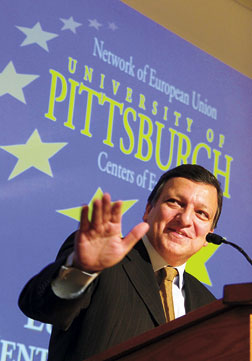EU Commission President Barroso Returns to Pitt for Honorary Degree, Luncheon
 José Manuel Barroso on an earlier visit to the University in February 2006
José Manuel Barroso on an earlier visit to the University in February 2006University of Pittsburgh Chancellor Mark A. Nordenberg conferred an honorary doctoral degree in public and international affairs upon José Manuel Barroso, president of the European Commission of the European Union (EU), during a Sept. 24 by-invitation-only luncheon event in Alumni Hall’s J.W. Connolly Ballroom.
Barroso was in Pittsburgh to represent the EU during the Sept. 24-25 global G-20 Summit, and his visit to the University was a homecoming of sorts. He first visited Pitt on Feb. 10, 2006, when he toured the University’s European Union Center of Excellence and European Studies Center and gave a lecture that attracted a standing-room-only audience.
The EU leader’s affection for the University and Pittsburgh was apparent. “Pittsburgh has been transformed by stressing the importance of new technologies, particularly information technology; medical research; biotechnology; nanotechnology; and robotics. The University, led with great skill and vision by Chancellor Nordenberg, has played a vital role in that effort, positioning Pittsburgh to capitalize on the knowledge societies of the future,” Barroso said.
Barroso also praised Pitt’s European Union Center of Excellence and its director, Alberta Sbragia, the Jean Monnet Professor ad personam and Mark A. Nordenberg University Chair. “In 1998, the University of Pittsburgh won a highly competitive award to found what is now the European Union Center of Excellence. The director of the center, Professor Alberta Sbragia, is one of the most-respected scholars of the EU in the world. She has built a remarkable program that plays a leading role among the broader network of Centers of Excellence in the United States,” Barroso said.
On the global front, the EU Commission head told the audience that he wanted to talk “about the need to build more bridges between Europe and the United States. And where better to do that than in ‘the City of Bridges’ itself?”
Barroso went on to say that he brought “three key messages” to Pittsburgh. The G-20 leaders must remain vigilant regarding the “fragile” global economic and financial situation, maintain pressure for reform of financial markets, and retain the “momentum of the G-20.” He also called for the U.S. and EU to work more closely to fight climate change.
The EU represents 27 European nations with a population of almost 500 million. It accounts for more than 30 percent of the world’s gross domestic product and 17 percent of the world’s trade.
Barroso, former prime minister of Portugal, became president of the European Commission in 2004. Earlier this month, the European Parliament approved his appointment as European Commission president for a second term.
During Barroso’s first term in office, European lawmakers and leaders reached agreement on more than 470 Commission proposals, including a landmark package of laws to fight climate change and promote clean energy. Barroso has championed economic and labor market reforms designed to make Europe more competitive globally. Under his leadership, the European Union Commission was the first international institution to produce a credible recovery plan to confront the global economic downturn.
After graduating in law from the University of Lisbon, Barroso earned a diploma in European Studies and a master’s degree in political science at the University of Geneva. As a distinguished academic, he lectured in political science at the University of Geneva, was a visiting professor in the School of Foreign Service at Georgetown University, and was head of the International Relations Department of Lusíada University. In 1985, he entered the Portuguese Parliament and rose quickly through government ranks as state secretary for home affairs, state secretary for foreign affairs, and then minister for foreign affairs. He was elected prime minister of Portugal in 2002; two years later, he resigned from that position to assume the presidency of the European Commission.
Barroso is the author of numerous publications and holds more than 20 decorations, including Portugal’s Grã-Cruz da Ordem Militar de Cristo in 1996, the 1992 Casa da Imprensa Prize for politics, and Spain’s “Medalla de Oro de la Ciudad de Zamora” in 2005.
The European Commission, headquartered in Brussels, is the executive branch of the EU, setting policy, proposing legislation, and promoting the common interests of the EU.
The University of Pittsburgh’s European Union Center of Excellence and European Studies Center are part of the University Center for International Studies (UCIS). UCIS has been recognized by the Council on Learning as one of the exemplary international studies programs in the United States. The University’s European Union Center of Excellence is one of only 11 centers in the United States to receive this designation by the European Commission. The European Studies Center has been designated as a National Resource Center by the U.S. Department of Education.
Other Stories From This Issue
On the Freedom Road

Follow a group of Pitt students on the Returning to the Roots of Civil Rights bus tour, a nine-day, 2,300-mile journey crisscrossing five states.
Day 1: The Awakening
Day 2: Deep Impressions
Day 3: Music, Montgomery, and More
Day 4: Looking Back, Looking Forward
Day 5: Learning to Remember
Day 6: The Mountaintop
Day 7: Slavery and Beyond
Day 8: Lessons to Bring Home
Day 9: Final Lessons

